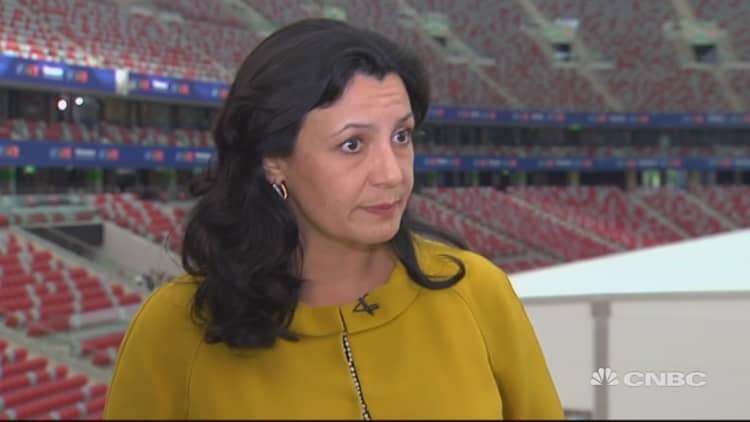


Western nations should not consider revoking tough economic sanctions against Russia, according to the deputy prime minister of Ukraine, who has told CNBC that the conflict in the eastern region of the country is escalating once again.
Ivanna Klympush-Tsintsadze said that the numbers of Ukrainian soldiers wounded had risen in the last month and was concerned that the recent rollover of sanctions against Russia would be the last.
"This concerns us extremely to put it mildly," she said on the sidelines of the NATO meeting in Poland on Friday.
"We are also worried about the tone that is already existing these days that says 'oh, well but maybe this is the last time we roll over the sanctions'. I do hope that if Russia does not show any progress in fulfilling any commitments under the Minsk accord nothing of that type will be coming to the political leaders of the EU leaders," she added.
The EU approved another six months of sanctions against Russia in early June which Klympush-Tsintsadze said was a "mature, sober and responsible decision." She told CNBC that the Kremlin is looking for ways to return to a "business as usual" type of relationship with the EU.
'Distinctive partnership'
Her comments come as members of the North Atlantic Treaty Organization meet in Poland on Friday with Russia expected to be high on the agenda. Indeed, NATO envoys will hold a further formal meeting with Russia next week in what many are suggesting could be a sign of thawing tensions.
Relations between the EU and Russia are at a low ebb after Russia's annexation of Crimea in 2014 and its alleged support for a pro-Russian uprising in east Ukraine. A fragile peace treaty between Russia and Ukraine known as the "Minsk agreement" is in place, but the EU and U.S. have said that sanctions remain until Russia fully implements the conditions of the agreement.
A senior United Nations human rights official, Ivan Simonovic, warned last month that wide spread hostilities in Ukraine could re-escalate unless urgent action is taken to separate sides and remove heavy weaponry.
Ukraine is not a member of NATO but Klympush-Tsintsadze told CNBC that it had a "distinctive partnership" with the alliance and would like to see "the doors to NATO remaining open" for the country.
"I think we can expect and we would like to expect NATO to do even more. And that could be done not only on the alliance level as such but it also could be done bilaterally. We have been told by the alliance that unfortunately the alliance as such cannot, for example provide Ukraine with defensive or lethal weapons. That's why we are conducting that discussion and that dialogue with the separate countries and members of the alliance," she said.
Troops in Baltics
Russian President Vladimir Putin has reportedly been in contact French President Francois Hollande and German Chancellor Angela Merkel on the subject of Ukraine. The three leaders stressed the need for a political solution to the conflict in the Donbass region in a telephone discussion Friday, according to Reuters.
There was also concern over frequent cease-fire violations in eastern Ukraine and they discussed a need for granting special legal status to eastern Ukraine as well as holding local elections, the news agency reported.
German lawmakers have been the most vocal on trying to lift the sanctions on Russia this summer, despite the heavy resistance coming from Ukraine. Ukrainian President Petro Poroshenko said "appeasement is not a solution" in an opinion piece written for the Wall Street Journal on Thursday and said Russia had been deliberately inciting instability wherever it could, "hoping to divide the West and advance its own geopolitical agenda."
Meanwhile, NATO has decided to station several thousand troops in Baltic countries and Eastern Europe on a rotational basis. The Kremlin has responded by saying that it's "absurd" to talk of any Russian threat, according to Reuters. It added that it hoped "common sense" would prevail at the meeting in Warsaw.



